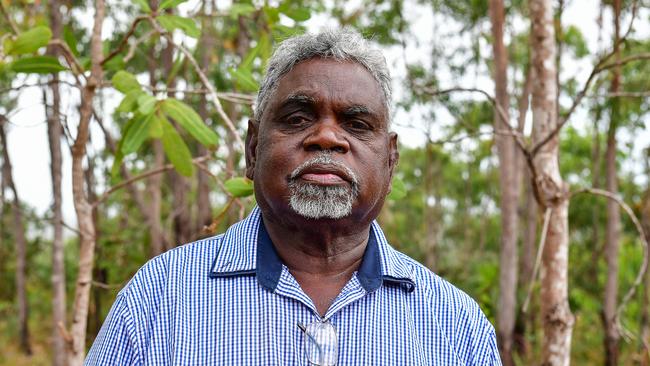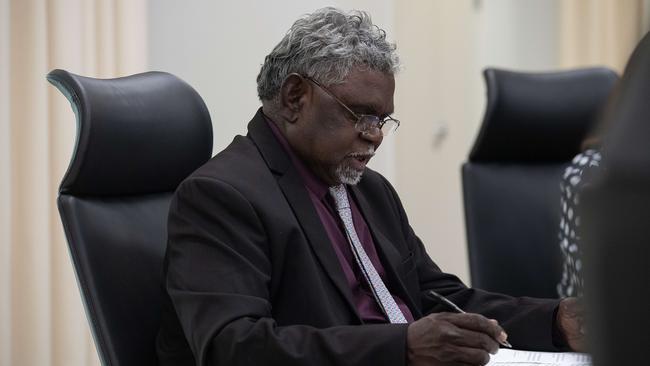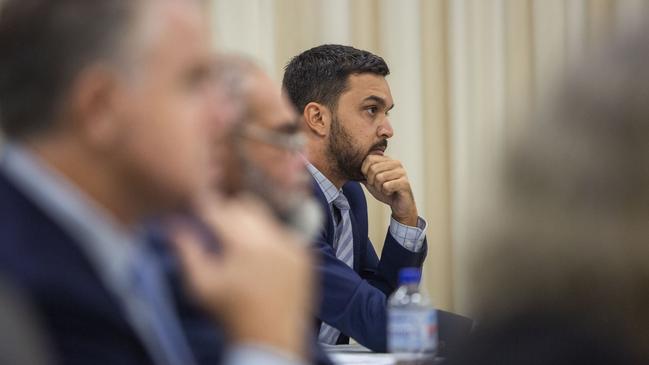Legal and Constitutional Affairs Committee opens debate over an Aboriginal Voice to the NT parliament
A Yolngu Elder told his parliamentary colleagues his people were “suffocating” under bureaucracy and has called for Aboriginal Territorians to be given a direct Voice to parliament.

News
Don't miss out on the headlines from News. Followed categories will be added to My News.
Aboriginal Territorians could soon have a direct connection to the floor of the Territory parliament as debate looms over the structure, powers and independence of a potential First Nations Voice.
In the first public hearing of the Legal and Constitutional Affairs Committee inquiry, Mulka representative Yingiya Guyula challenged both sides of politics to honour their repeated calls for “self determination” and allow an independent, properly-resourced body for First Nations people to be involved in the development, consultation and review of bills.
“While I have been in this parliament I have heard the government and opposition say they believe in self-determination, but at the same time they are still making laws and policies for First Nations people,” Yolngu leader said.
“Balanda (non-Indigenous) laws and policies are being rolled out on top of us and our people everyday.”
The public hearing comes four months after the failed national referendum, which resulted in the Territory’s urban centres swinging against a Voice in the Australian constitution, while 22 of the 23 bush polling booths recording a majority ‘yes’ vote.
On Friday the inquiry heard submissions from several legal and human rights experts, and Aboriginal organisations, all of whom endorsed a Voice to parliament, as well as the concerns from NT government departments.

Questions still loom around how the Voice would operate, including questions around its independence, structure, membership, resourcing, authority.
Mr Guyula suggested policy reviews be taken to grassroots community consultation via a role similar to the Treaty Commissioner, while others suggested it should be similar to the old scrutiny committees — which were axed in 2020.
The Northern and Central Land Councils said the abandonment of the scrutiny committees and overall decline in stakeholder engagement had led to policies “at best inadequate, and at worst harmful, legislation”.
“(The Voice) sits alongside our broader concern that the NT government has abandoned its commitment to transparency and accountability,” the submission said.
However, the land councils warned against the Voice becoming a “tick the box” exercise or another layer of bureaucracy, and suggested a “flexible” review time frame between six weeks to six months.

The North Australian Aboriginal Justice Agency was critical of the “unduly narrow” proposal of reviewing tabled bills, calling for Indigenous people to be involved at the “earliest possible stages of the law and policy making process”.
The Anti-Discrimination Commission volunteered to play a “secretariat role” to a future First Nations Committee.
While supportive of Aboriginal engagement, the Department of Chief Minister and Cabinet raised its concerns over “consultation fatigue” and “overburdening the community with multiple visits”.
“The one message we all hear constantly is ‘stop coming out every time you’ve got one little thing to consult on’,” Deputy CEO Policy and Reform Tom Leeming said.
The Health Department argued against a scrutiny committee or Statements of Compatibility, arguing instead for engagement to remain within the current Regulation-Making Framework.
While Health said it “supports transparent legislation” it was “concerned about the burden of scrutiny committees” which could compel public servants to appear before the public hearings.
The next hearing will occur in March.
More Coverage
Originally published as Legal and Constitutional Affairs Committee opens debate over an Aboriginal Voice to the NT parliament





